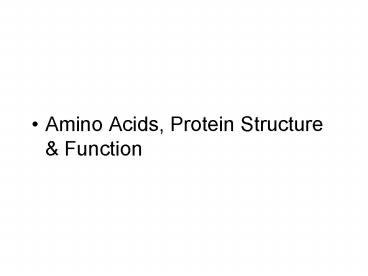Amino Acids, Protein Structure - PowerPoint PPT Presentation
1 / 49
Title:
Amino Acids, Protein Structure
Description:
20 fundamental building blocks of proteins. All proteins contain mainly ... Amino acid sequence of bovine insulin. Certain amino acids can be phosphorylated ... – PowerPoint PPT presentation
Number of Views:178
Avg rating:3.0/5.0
Title: Amino Acids, Protein Structure
1
- Amino Acids, Protein Structure Function
2
(No Transcript)
3
(No Transcript)
4
- Amino Acids (AA)
- 20 fundamental building blocks of proteins
- All proteins contain mainly these 20 AAs
- All have a-amino group (amino)
- All have a-carboxyl group (acid)
- Each has a distinctive "R" group or side chain
- Properties of "R" group defines uniqueness
- of each amino acid
- Must know names, (structures) and
abbreviations of all 20 amino acids, as well as
some of their properties!!!!!!!!
5
In nature, mostly L-AAs form proteins
L and D isomers are mirror images, they are chiral
6
At neutral pH AAs exist as DIPOLAR IONS or
ZWITTERIONS
7
(No Transcript)
8
(No Transcript)
9
(No Transcript)
10
essential!
essential!
essential!
11
essential!
essential!
essential!
12
(No Transcript)
13
(No Transcript)
14
should be NH3 at pH 7
15
(No Transcript)
16
(No Transcript)
17
should be NH3 at pH 7
essential!
18
should be NH3 at pH 7
ium group
19
often in cat. center, good H acceptor
disulfide bonds pigments, thyroid hormones
20
Cysteines can form covalent disulfide bonds
21
Amino acid sequence of bovine insulin
22
Certain amino acids can be phosphorylated
23
Aromatic side chains absorb UV light
24
(No Transcript)
25
(No Transcript)
26
(No Transcript)
27
(No Transcript)
28
The peptide bond is planar and highly stable
29
The orientation of the side chains alternates
in a peptide chain
30
The AA sequence is read from the N- to the
C-terminus
31
(No Transcript)
32
Models of a right-handed ?-helix
33
Alpha helix
34
Collagen triple helix is NOT formed from three
?-helices
35
No hydrogen bonds WITHIN a single strand of a
collagen triple helix
Prolines and hydroxyprolines kink the helix and
stabilize the structure by steric repulsion
36
Primary AA sequence of collagen (Gly in every 3rd
pos.)
37
Glycine is small and doesnt take up much space
in the center of the triple helix
Helices are connected through hydrogen bonds
38
Tertiary structure of myoglobin
39
Myoglobin
cut through the middle
Charged AAs (blue) on the surface, hydrophobic
AAs (yellow) on the inside
40
Structure of the CD4 receptor (tertiary structure
of a single polypeptide chain that folds into
four distinct domains)
parallel
anti-parallel
Predominant secondary structure is the ?-strand.
Multiple ?-strands form so-called ?-sheets, which
can be parallel or anti-parallel.
41
A single extended beta-strand
42
Anti-parallel ?-sheet
43
Parallel ?-sheet
44
A mixed ?-sheet
45
(No Transcript)
46
Name the interaction!
Phe Cys Ile
N-term
Asp
Lys
Ser
Ala
C-term
Val Tyr
Side chains play key role in determining the
3D-folding of a polypeptide
47
(No Transcript)
48
Hemoglobin is composed of two ?- and two
?-subunits
49
What you need to know -Names and abbreviations
of 20 AAs, their structural features (which ones
are polar, aliphatic, aromatic, can be
phosphorylated, are essential etc.) -Which isomer
occurs naturally? -The four levels of protein
structure primary (AA sequence),
secondary (local conformation, e.g., a-helix,
b-sheet), tertiary (3D structure) and quaternary
(interaction of subunits). -H-bonds in ?-helix
and ?-sheets (N-H of peptide bond is H donor, C-O
is H-acceptor), different types of
?-sheets. -Whats the chemical nature of the
peptide bond? Its an amide -Collagen structure
(how is it unusual?) Every 3rd AA is Gly
(why?), -Whats the function of proline and
hydroxyproline in collagen? How do these AAs
stabilize the single strand of a collogen triple
helix? -How do side chains contribute to overall
structure? Ionic interactions (or salt
bridges), hydrophobic interactions, hydrogen
bonds, disulfide bonds -Whats the orientation of
the side chains in an extended polypeptide chain?































